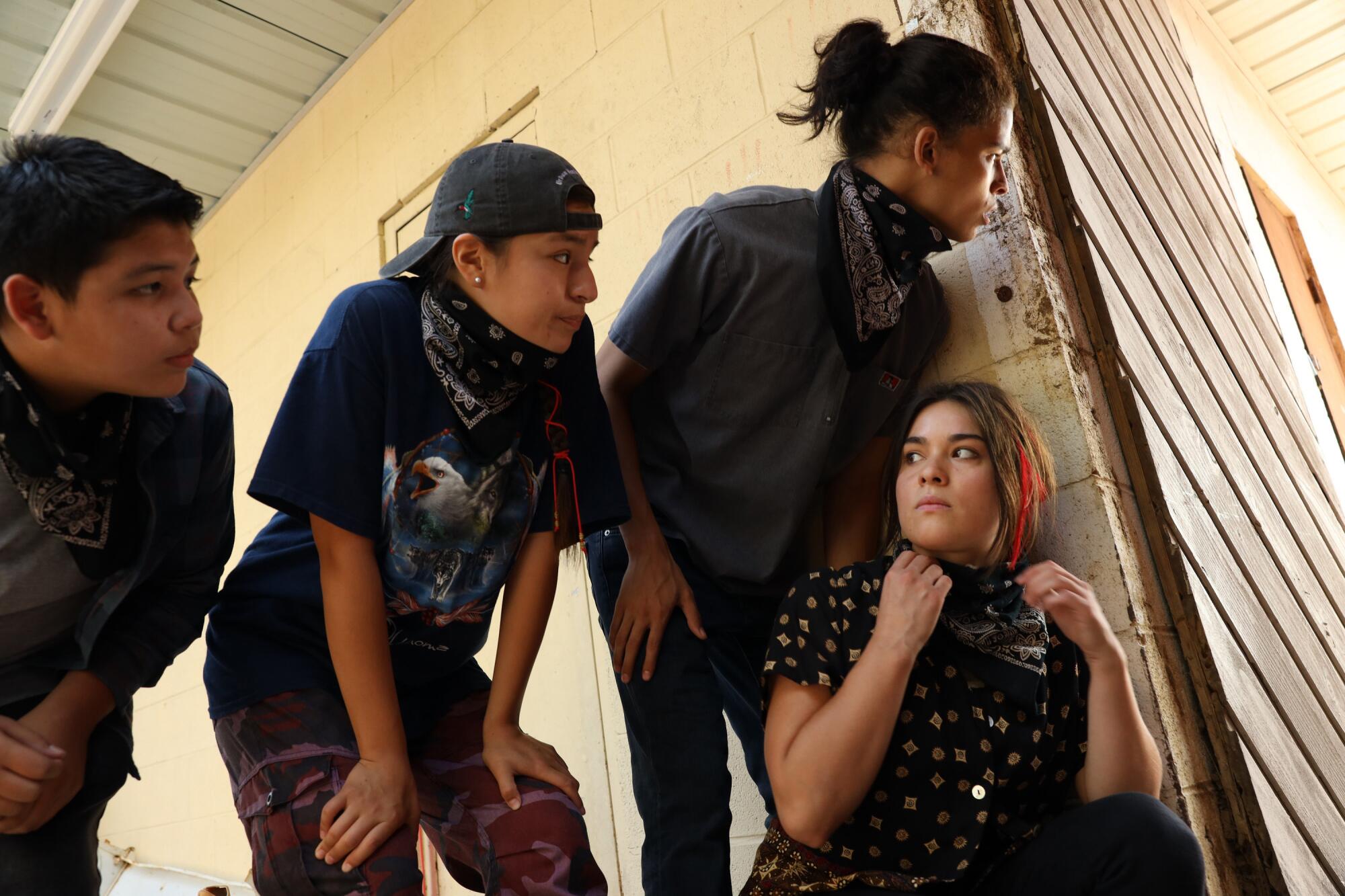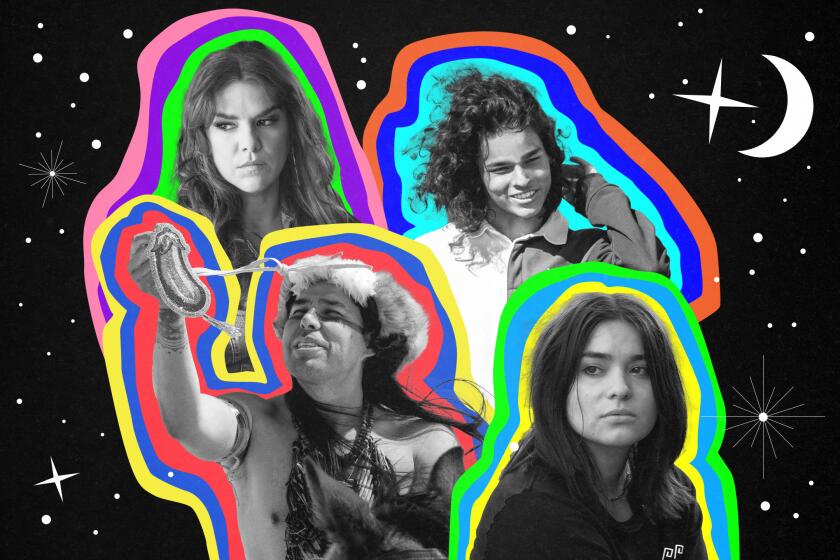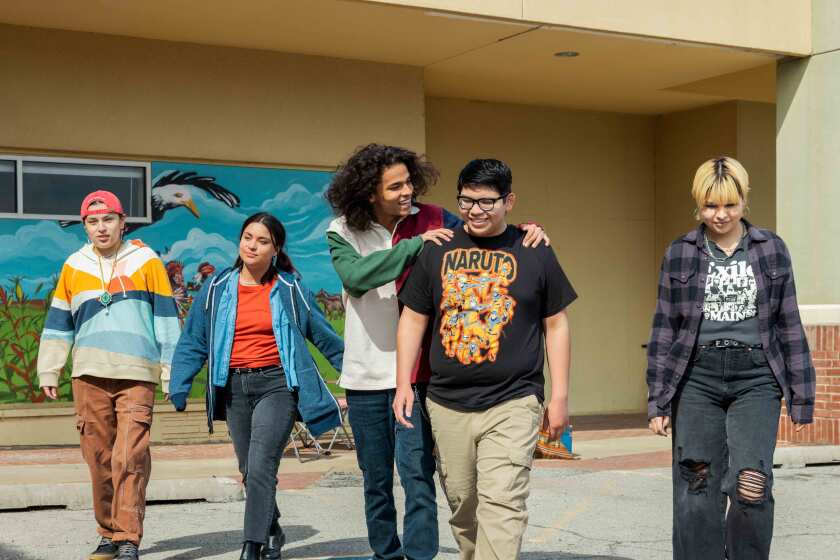
- Share via
Before she’d filmed a single frame of “Reservation Dogs,” the funny, soulful FX series about four Indigenous teenagers in rural Oklahoma, Paulina Alexis, who plays fan-favorite Willie Jack, was sure it’d be a hit. “That was just the vibe [the pilot script] gave off,” says Alexis, who grew up on the Alexis Nakota Sioux First Nation reserve in Alberta, Canada. “It was just kids doing regular rez kid stuff. I knew it was going to blow up.”
Recently, Alexis joined castmate Devery Jacobs, who was raised in Kahnawake Mohawk Territory and played rez dog Elora Danan, to excavate some “Reservation Dogs” memories — including the fluctuating extremes of Oklahoma weather. “We filmed during tornado season,” says Jacobs, who also wrote and directed for the show. “It’d be freezing, and then the same day it’d be boiling, sweltering hot. It’s very intense. But Sterlin [Harjo, the series’ showrunner] wanted to set this story where he’s from, and you can feel that. I don’t think we could fake it if it was anywhere else.”
Although the breakout series was the first to be created, produced and written by and starring Indigenous people — and has a Rotten Tomatoes score of 99% — Harjo decided that the right time to end it was after three seasons.
As “Reservation Dogs” comes to an end on Wednesday, L.A. Times television critics Robert Lloyd and Lorraine Ali mull the meaning of the show and why they loved it.
Much of “Reservation Dogs” was shot in tiny Okmulgee, Okla. What do you miss about it?
Paulina Alexis: Oklahoma is so beautiful. They have the best sunsets. Just being in that atmosphere, especially while working? It feels really good. It was like a family. The people are the nicest. It’s not too big or too small. There’s lots of fields. It feels very open. I found myself missing Oklahoma.
Devery Jacobs: The people in Oklahoma, specifically in Tulsa, where we also got to film, were incredible. They’re so disarming. The Black, brown and Native folks there are so resilient and have been through so much.
Which cast member knew every single person in town?
Jacobs: That’s D’Pharoah [Woon-A-Tai, who plays Bear Smallhill]. He was always out on some kind of adventure. Anytime I’d see him, he’d be like, “Oh, I went to this museum.” “I went on this hike.” “Oh, we were pulled over by the cops but they saw ‘Rez Dogs,’ so they let us go.”

Paulina, you were the only actor permitted to go off script. Explain.
Alexis: I don’t know exactly how to explain it. But Willie Jack? Anything she’d say, I’d say. Even in the auditions, I changed the way I’d read it because it just wouldn’t roll off my tongue. And I think that’s what got me the role. My brothers are all really talented, really funny. Growing up with them taught me improv. The best advice they gave me was, “If you’re going to say things, just say them.” When you’re acting, it’s too performative. It takes away the naturalness.
Jacobs: Willie Jack’s lines were always written just as a suggestion. Then Paulina would riff. Her improv skills are unmatched.
Devery, talk about joining the writers’ room in the second season.
In comedies, a lot of times you see these characters who don’t grow, where it’s kind of the same thing for them in every episode. It works for procedurals, which we love. One of the beautiful things about “Rez Dogs” is that we see evolutions of these characters and also of this community. People moving through grief, people moving forward, people healing, growing up, people leaving, coming home and everything in between.
Paulina, you always said that Willie Jack should be that girl on every rez, the one with the baseball cap and the braids.
Alexis: The show means a lot to not just me but to Natives across America, Canada. Growing up, you don’t see Native people on TV. [Pauses] Well, I’ve seen Native people on TV, but they’re not accurately how we are. So I wanted to bring that to life. It really hit home when people started reaching out to me saying that they never saw anyone on TV that looked like them until they saw me. That meant a lot because that used to be me.
Longtime indie filmmakers Danis Goulet and Blackhorse Lowe discuss their work on “Reservation Dogs” and how the series bolstered Native American representation onscreen and behind the camera.
What’s a trope about Indigenous people that you hope to never see on TV ever again?
Jacobs: Anything that’s remotely resembling a Pocahontas stereotype. I remember saying to my agent, “If I’m ever going to have a sex scene, my bottom line is that it can’t be in buckskin or on a bed of furs.” I don’t want to see it. I don’t think it needs to be seen. I want to be portrayed as the modern people that we are.
What was especially difficult about the end of “Reservation Dogs”?
Jacobs: I could break down crying at any time talking about this show, because we miss it so much. I don’t know that we had the closure of saying goodbye, where we were entirely certain that Season 3 would be the real finale. There was still a crack in the door open, that the show might continue. And then the writers’ strike happened. Then the actors’ strike. And we didn’t get to see each other. It felt like it [ended] without us really knowing and that we were robbed of the opportunity for all of us to let this story go at the same time.
More to Read
Sign up for The Envelope
Get exclusive awards season news, in-depth interviews and columnist Glenn Whipp’s must-read analysis straight to your inbox.
You may occasionally receive promotional content from the Los Angeles Times.









